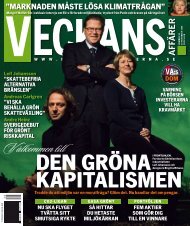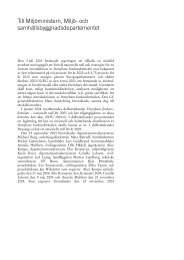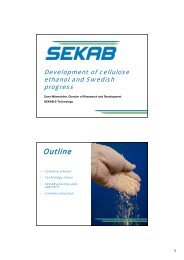Sugarcane ethanol: Contributions to climate change - BAFF
Sugarcane ethanol: Contributions to climate change - BAFF
Sugarcane ethanol: Contributions to climate change - BAFF
You also want an ePaper? Increase the reach of your titles
YUMPU automatically turns print PDFs into web optimized ePapers that Google loves.
Introduction <strong>to</strong> sugarcane <strong>ethanol</strong><br />
Cellulose is the substance that makes up the cell walls of plant matter along with<br />
hemicellulose and lignin. Cellulose conversion technologies will allow the utilization of<br />
nongrain parts of crops like maize s<strong>to</strong>ver, rice husk, straws, sorghum stalk, bagasse from<br />
sugarcane and wood and wood residues. Among the cellulosic crops perennial grasses<br />
like switchgrass (Panicum virgatum L.) and Miscanthus are two crops considered <strong>to</strong> hold<br />
enormous potential for <strong>ethanol</strong> production. Perennial crops o�er other advantages like<br />
lower rates of soil erosion and higher soil carbon sequestration (Khanna et al., 2007;<br />
Schuman et al, 2002) However, technologies for conversion of cellulose <strong>to</strong> <strong>ethanol</strong> are<br />
just emerging and not yet technically or commercially mature.<br />
Furthermore, lignin-rich fermentation residue, which is the co-product of <strong>ethanol</strong><br />
made from crop residues and sugarcane bagasse, can potentially generate electricity<br />
and steam.<br />
6. Brazil as main exporter<br />
Brazil has been by far the largest exporter of <strong>ethanol</strong> in recent years. In the crop season<br />
2007/08, its hydrated <strong>ethanol</strong> exports amounted <strong>to</strong> 3.7 billion litres, of the 5 billion litres<br />
of <strong>ethanol</strong> traded globally (excl. intra-EU trade) (AgraFNP, 2008). �e US imported more<br />
than half the <strong>ethanol</strong> traded in 2006. Of the 2.7 billion litres imported by the US in 2006,<br />
about 1.7 billion litres were imported directly from Brazil, while much of the remainder<br />
was imported from countries which are members of the Caribbean Basin Initiative (CBI)<br />
which enjoy preferential access <strong>to</strong> the US market and import (hydrated) <strong>ethanol</strong> from Brazil,<br />
dehydrate it and re-export <strong>to</strong> the US.<br />
China, <strong>to</strong>o, has been a net exporter of <strong>ethanol</strong> over the last several years, though at<br />
signi�cantly lower levels than Brazil. Despite some exports <strong>to</strong> the US as well as <strong>to</strong> CBI<br />
countries, most of the larger destinations for Chinese <strong>ethanol</strong> are within the Asian region,<br />
in particular South Korea and Japan (OESO, 2008). �e EU is also a net importer.<br />
7. What makes the <strong>ethanol</strong> attractive?<br />
One may observe a variety of reasons for the recent bio<strong>ethanol</strong> interest. From the market<br />
point of view, there is an increasing consensus about the end of cheap oil and the volatility<br />
in world oil prices. Nowhere is the need for alternative <strong>to</strong> fossil oil felt more than in the<br />
transport sec<strong>to</strong>r. Transport consumes 30% of the global energy, 98 % of which is supplied<br />
by fossil oils (IEA, 2007).<br />
From a policy point of view, other fac<strong>to</strong>rs are mentioned, such as assuring energy security,<br />
reducing greenhouse gas emissions, increase and diversi�cation of incomes of farmers and<br />
rural communities and rural development. And next there are arguments that <strong>ethanol</strong> is<br />
replenishable, that the <strong>ethanol</strong> industry can create new jobs, and that feeds<strong>to</strong>ck for <strong>ethanol</strong><br />
can be made easily available considering already existing technologies.<br />
<strong>Sugarcane</strong> <strong>ethanol</strong> 23












